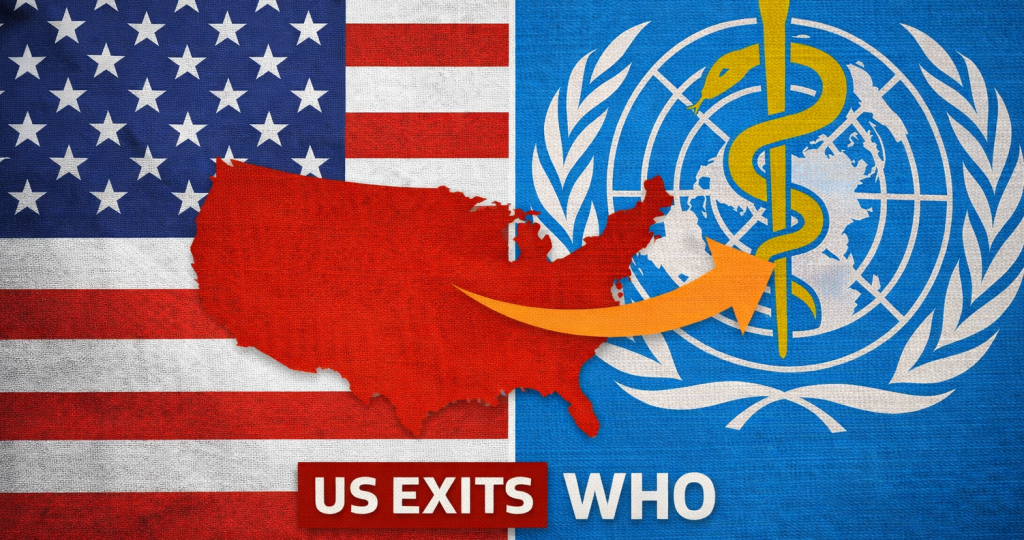Written and Reviewed by Team Pharmacally

Update on 22 January 2026: USA has Officially exited from WHO; to read complete article on exit please Click Here
In July 2020, the United States took the significant step of formally notifying the United Nations of its intent to withdraw from the World Health Organization (WHO). This bold move, initiated by the Trump administration, was made during the global COVID-19 pandemic—a critical period requiring robust international collaboration in public health. The decision ignited vigorous debate and widespread scrutiny, raising pressing concerns about the implications for global health and the future of U.S. leadership in international organizations. This analysis will delve into the decisive reasons behind the withdrawal, the WHO’s response, and the far-reaching consequences of this action.
Reasons for the Withdrawal
The Trump administration cited several reasons for withdrawing from the World Health Organization (WHO). A primary concern was the organization’s alleged mishandling of the initial COVID-19 outbreak in Wuhan, China. The administration accused the WHO of being overly deferential to China and of failing to take decisive action to prevent the virus’s spread. Former President Donald Trump often criticized the WHO for its “lack of accountability” and “mismanagement.”
Another significant issue was funding. The United States had long been the largest contributor to the WHO’s budget, supplying approximately 15% of its total funding. The Trump administration argued that the U.S. was shouldering an unfair financial burden while other countries were not contributing their fair share. By withdrawing from the WHO, the administration aimed to redirect those funds toward different global and domestic health initiatives.
WHO Response
The World Health Organization (WHO) expressed disappointment over the U.S. decision, emphasizing the critical importance of global solidarity in addressing health crises. WHO Director-General Dr. Tedros Adhanom Ghebreyesus highlighted the organization’s commitment to transparency and reform, while urging member states to remain united in their fight against the pandemic.
Dr. Tedros acknowledged the U.S.’s long-standing contributions to global health and emphasized the value of its partnership. He reiterated that the WHO’s mission is to serve all nations impartially and equitably. The organization also noted that it had launched multiple independent reviews of its pandemic response to address concerns raised by member states, including the U.S.
Global Reactions and Implications
The U.S. withdrawal faced widespread criticism from global leaders, health experts, and advocacy groups. Critics argued that this decision undermined international cooperation at a time when a coordinated global response was essential to address the pandemic. They also warned that it could weaken the World Health Organization’s (WHO) ability to respond to future health crises, considering the significant financial and strategic role the United States plays.
Domestically, reactions to the decision were mixed. Some praised the administration for standing firm against perceived inefficiencies in international organizations, while others viewed it as a short-sighted move that jeopardized public health and diminished the U.S.’s influence on the global stage.
Re-engagement under the Biden Administration
The U.S. withdrawal from the World Health Organization (WHO) officially took effect on July 6, 2021. However, shortly after taking office in January 2021, President Joe Biden reversed this decision by signing an executive order to rejoin the organization. The Biden administration highlighted the significance of global health collaboration and committed to renewed support for the WHO, which included funding and vaccine distribution initiatives.
Current Status of the Withdrawal
On January 20, 2025, President Donald Trump signed an executive order to initiate the United States’ withdrawal from the World Health Organization (WHO). This withdrawal process requires a 12-month notice period, during which the U.S. will stop its financial contributions and recall personnel involved with the WHO.
This decision has raised significant concerns among global health experts, as the U.S. has been a major contributor to the WHO, donating nearly $1.3 billion over the two years leading up to 2023. This funding accounted for approximately 15% of the organization’s budget. Experts warn that the reduction in funding could weaken the WHO’s ability to respond effectively to health emergencies, particularly in low-income countries.
The WHO has expressed regret over the U.S. decision, highlighting the longstanding collaboration and the critical role the U.S. has played in global health initiatives. Public health experts caution that this withdrawal may limit the U.S.’s access to vital health information and hinder its ability to collaborate on international health crises, potentially increasing vulnerability to disease outbreaks.
As of now, the U.S. is in the process of withdrawing, with the final exit expected to be completed by January 2026, unless the decision is reconsidered or reversed by future administrations.
Conclusion
The U.S. withdrawal from the World Health Organization (WHO) marked a contentious period in global health diplomacy, emphasizing the challenges of balancing national interests with international cooperation. Although this decision was eventually reversed, it highlighted the need for meaningful dialogue and reform within global institutions to address the concerns of all member states. As the world continues to confront complex health challenges, this episode serves as a reminder of the essential role of unity and collaboration in protecting global health.
References:
1. Withdrawing the United States from Word Health Organization, the White House, 20 January 2025-01-23
2. WHO comments on United States’ announcement of intent to withdraw, World Health Organization, 21 January 2025-01-23
3. Gostin, Lawrence O et al, US withdrawal from WHO is unlawful and threatens global and US health and security, The Lancet, Volume 396, Issue 10247, 293 – 295
4. Buse K, Gostin L, Kamarulzaman A, McKee M. The US withdrawal from the WHO: a global health crisis in the making BMJ 2025; 388:r116 doi:10.1136/bmj.r116
5. What to know about the WHO and its rocky relationship with the U.S., The Washington Post, 21 January 2025
